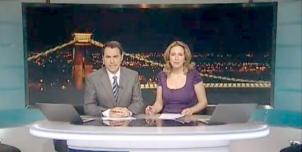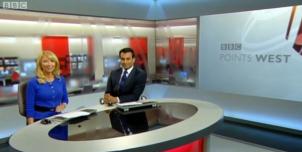Full Freeview on the Mendip (Somerset, England) transmitter
| Google Streetview | Google map | Bing map | Google Earth | 51.237,-2.626 or 51°14'12"N 2°37'33"W | BA5 3LB |
The symbol shows the location of the Mendip (Somerset, England) transmitter which serves 720,000 homes. The bright green areas shown where the signal from this transmitter is strong, dark green areas are poorer signals. Those parts shown in yellow may have interference on the same frequency from other masts.
This transmitter has no current reported problems
The BBC and Digital UK report there are no faults or engineering work on the Mendip (Somerset, England) transmitter._______
Digital television services are broadcast on a multiplexes (or Mux) where many stations occupy a single broadcast frequency, as shown below.
64QAM 8K 3/4 27.1Mb/s DVB-T MPEG2
DTG-12 QSPK 8K 3/4 8.0Mb/s DVB-T MPEG2
H/V: aerial position (horizontal or vertical)
Which Freeview channels does the Mendip transmitter broadcast?
If you have any kind of Freeview fault, follow this Freeview reset procedure first.Digital television services are broadcast on a multiplexes (or Mux) where many stations occupy a single broadcast frequency, as shown below.
64QAM 8K 3/4 27.1Mb/s DVB-T MPEG2
DTG-12 QSPK 8K 3/4 8.0Mb/s DVB-T MPEG2
H/V: aerial position (horizontal or vertical)
Which BBC and ITV regional news can I watch from the Mendip transmitter?

ITV West Country News (East) 0.9m homes 3.4%
from Bristol BS4 3HG, 23km north (11°)
to ITV West region - 61 masts.
All of lunch, weekend and 50% evening news is shared with West Country (West)
Are there any self-help relays?
| Cheddar | Transposer | 15 km E Weston-super-Mare | 1674 homes |
| Luccombe | Active deflector | 6 km w Minehead | 38 homes |
How will the Mendip (Somerset, England) transmission frequencies change over time?
| 1984-97 | 1997-98 | 1998-2010 | 2010-13 | 2013-18 | 2013-17 | 27 Feb 2018 | |||
| C/D E | E | E | C/D E | C/D E T | W T | W T | |||
| C30 | _local | ||||||||
| C32 | BBCA | ||||||||
| C33 | com7 | com7 | |||||||
| C34 | D3+4 | ||||||||
| C35 | com8 | com8 | |||||||
| C36 | ArqB | ||||||||
| C37 | C5waves | C5waves | |||||||
| C48 | SDN | SDN | SDN | SDN | |||||
| C49tv_off | BBCA | BBCA | |||||||
| C51tv_off | LBS | LBS | |||||||
| C52tv_off | ArqB | ArqB | ArqB | ||||||
| C54tv_off | C4waves | C4waves | C4waves | D3+4 | D3+4 | D3+4 | |||
| C55tv_off | com7tv_off | ||||||||
| C56tv_off | ArqA | ArqA | ArqA | COM8tv_off | |||||
| C58tv_off | BBC1waves | BBC1waves | BBC1waves | BBCB | BBCB | BBCB | |||
| C61 | ITVwaves | ITVwaves | ITVwaves | BBCA | |||||
| C64 | BBC2waves | BBC2waves | BBC2waves |
tv_off Being removed from Freeview (for 5G use) after November 2020 / June 2022 - more
Table shows multiplexes names see this article;
green background for transmission frequencies
Notes: + and - denote 166kHz offset; aerial group are shown as A B C/D E K W T
waves denotes analogue; digital switchover was 24 Mar 10 and 7 Apr 10.
How do the old analogue and currrent digital signal levels compare?
| Analogue 1-4 | 500kW | |
| Analogue 5 | (-6dB) 126kW | |
| SDN, ARQA, ARQB, BBCA, D3+4, BBCB | (-7dB) 100kW | |
| com7 | (-8.4dB) 72.4kW | |
| com8 | (-8.6dB) 69.1kW | |
| Mux 1*, Mux 2*, Mux A*, Mux B*, Mux C*, Mux D*, LBS | (-17dB) 10kW |
Which companies have run the Channel 3 services in the Mendip transmitter area
|
|
Friday, 26 September 2014
D
David Newton3:14 PM
Thanks again,
Confirming the local TV shop on Baker St, a few hundred yards around the corner from our house
does receive 106.
Our addres is betwen Baker St and Boulevard, not too far from the old library.
Ok, None of our HD devices wil manually tune to 33 or 31.
LG TV blocks the Update buttton for these 2 channels.
Humax finds no results.
Panasonic sticks on infinite 'searching'
Bt/Humax Youview does not appear to have a manual function,.
The aerial is at least 15 to 20 years old, installed by previous owners before we moved in.
So, should we consider the cost of a new aerial install, or is it possible we live in some kind of reception black hole ?
As mentioned, reception for all other main channels is very good.
What else apart from BBC4HD are we missing at the moment ?.
cheers...
| link to this comment |
D
David Newton5:00 PM
"As mentioned, reception for all other main channels is very good.
What else apart from BBC4HD are we missing at the moment ?."
It's ok, I just noticed the list on this page - so that's already answered.
cheers...
| link to this comment |
J
jb385:32 PM
David Newton: The Humax is by far the best device to use for signal checking purposes, but can you confirm that you did select DVB-T2 (and not DVB-T) as the transmission mode when entering the manual scan Mux channel number?
| link to this comment |
D
David Newton9:54 PM
Hi,
Humax HDR-2000t
confirmed - DVB-T2 selected for both 33 & 31.
No channels found.
cheers...
| link to this comment |
Saturday, 27 September 2014
M
Martin Batchelor12:19 PM
Templecombe
COM 7 & 8 from Mendip mast are on Chans 33 & 35.
I posted on this topic several months ago but got no response. COM 7 & 8 only transmit at 17.5KW not 100KW as for the other channels. Therefore users in some more remote/shaded areas will not receive the later HD channels.
I can receive ALL HD channels from Rowridge but then cannot get West news. Have been unable to find out if the channnels power will be increased, perhaps someone reading this will know.
| link to this comment |
Martin's: mapM's Freeview map terrainM's terrain plot wavesM's frequency data M's Freeview Detailed Coverage
R
Russ Dring9:09 PM
Martin Batchelor: Mendip com 7 power is in fact just over 70 kW it is however out of band from the rest of Mendip's channel allocation. It is unlikely that the power of com 7 and com 8, if it materialises, will increase.
| link to this comment |
Dave Lindsay
9:22 PM
9:22 PM
Martin Batchelor: Use two aerials and a diplexer which "splits" at C38. Be aware, though, that C37 will be attenuated a bit, this being the channel of the forthcoming COM8 from Rowridge. Television Aerial Boosters / Amplifiers, Splitters, Diplexers & Triplexers
| link to this comment |
Sunday, 28 September 2014
P
Pete Green9:43 AM
DAVID NEWTON
Get a wideband aerial and you will get channel 33 but not 31. It's local for Bristol.
| link to this comment |
M
Martin Batchelor11:29 AM
Templecombe
Thanks for all your helpful replies. BUT you have all missed an important point! The channels from Rowridge are all at the low channel end of the band, COM7 is C31.
I receive all these, including Chan 31, at nearly full signal on the signal strength meter. Thus why should C33 not be seen?
The aerial is wideband and I have tried another with the same results.
Because the polar plot has no distance scale it is impossible to see whether I am outside COM7's predicted reception area.
Unfortunately I have been unable to find anyone in the village who has Freeview HD so am unable to check their reception.
All suggestions gratefully received.
| link to this comment |
Martin's: mapM's Freeview map terrainM's terrain plot wavesM's frequency data M's Freeview Detailed Coverage
Dave Lindsay
2:35 PM
2:35 PM
Martin Batchelor: If you are using a wideband aerial to receive Group A channels (which COM7 does, and COM8 will, use exclusively) then a log periodic or Group A yagi is best: Rowridge Transmitter A yagi "wideband" is such a great compromise that the gain on Group A channels will be nothing like the single gain figure quoted by the manufacturer. The polar plot effectively indicates the level of power emitted in each direction. It is nowhere near as simple as drawing a circle which shows which areas the signal is available in. Consider your location: Here is a plot of the terrain between you and the transmitter:
Terrain between ( m a.g.l.) and (antenna m a.g.l.) - Optimising UK DTT Freeview and Radio aerial location Those 19 miles from the Mendip transmitting station will have excellent reception where it can be seen. Indeed, line-of-sight (or "closeness" to) is the most important factor as high power transmitters can be received many tens of miles away in locations where there is nothing in the way. At your location, other than trees and nearby buildings that could hamper, there is higher ground which might provide difficulty. At 5.5 miles out there is Bratton Hill and, looking at the contours, nearby are other high parts, some of which are tree-covered. At 1 mile out there is slightly higher ground at Horsington, which has objects on it (buildings and trees). The power of Mendip's COM7, according to Digital UK, is 72.35kW. The signal is 2dB down in your direction which means you have an effective radiated power of 45.65kW in your direction. We have no idea whether the main six multiplexes are attenuated in the same way as the powers that be won't release the radiation patterns for them. The radiation pattern for Mendip's COM8 doesn't look good for you, particularly if you're struggling with COM7. There is a -12dB notch in your direction which, assuming a full ERP of 72.35kW gives you 4.56kW, assuming no signal bending (which could help you or alternatively give you varying reception). As for reception of COM7 from Rowridge are you sure it's from Rowridge? For these channels Rowridge and Wenvoe is (will be) co-channel and you said you can receive from Wenvoe. A terrain plot for Rowridge shows that Cranborne Chase is in your way:
Terrain between ( m a.g.l.) and (antenna m a.g.l.) - Optimising UK DTT Freeview and Radio aerial location Your path to Wenvoe is blocked from about 3 miles out:
Terrain between ( m a.g.l.) and (antenna m a.g.l.) - Optimising UK DTT Freeview and Radio aerial location According to Digital UK, COM7 from Wenvoe is as 46.99kW as against 100kW for PSBs and 50kW for COMs. From Rowridge it is 24.41kW versus 200kW for PSBs and 50kW for COMs (horizontally). The bearing of Mendip is 331deg and that to Wenvoe is 311deg. If the COM7 on C31 is actually coming from Wenvoe then you "might" get away with turning your aerial a little anti-clockwise so as to pick up COM7 (and COM8) from Wenvoe and the other channels from Mendip. Neither Rowridge nor Wenvoe look as if they may provide stable reception all year round, so be ready for the picture to break up or disappear completely. Additionally, one could interfere with the other (for COM7 and COM8).
| link to this comment |
Select more comments
Your comment please!






